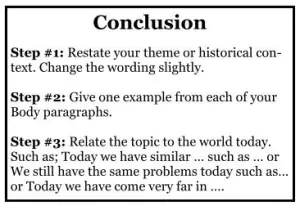 Sometimes writers do not pay proper attention to the concluding part of their work, considering it to be rather a formality than a necessity. In reality, a proper conclusion is as important as a thoroughly-composed introduction, as it must synthesize your central points and leave readers hungry for more knowledge that pertains to your main topic. The main purpose of a conclusion is to show the major points, theories, and data you covered in the main body section of your paper. Hence, you should pay close attention to how you write a conclusion.
Sometimes writers do not pay proper attention to the concluding part of their work, considering it to be rather a formality than a necessity. In reality, a proper conclusion is as important as a thoroughly-composed introduction, as it must synthesize your central points and leave readers hungry for more knowledge that pertains to your main topic. The main purpose of a conclusion is to show the major points, theories, and data you covered in the main body section of your paper. Hence, you should pay close attention to how you write a conclusion.


✅ AI Essay Writer ✅ AI Detector ✅ Plagchecker ✅ Paraphraser
✅ Summarizer ✅ Citation Generator
Steps for Writing
– Read through your paper carefully; pay attention to the thesis statement and the main points you covered in the main body.
– Restate and rewrite the main points and the thesis statement without changing their meaning. This is needed so that the conclusion does not look like a repetition of the main body sentences.
– Think of the ways the information in the conclusion is important for readers and formulate it in 1-2 brief sentences.
– Write the concluding paragraph; remember that it should be short and clear. The last sentence of the concluding sentence is as significant as the thesis statement in the introduction.
– Make sure the conclusion covers your thesis statement, the main points, shows the importance of the material in the paper, and has a finishing touch. Proofread and edit it, if necessary.
Key Points to Consider
– Generally speaking, a good conclusion should answer the question “So what?” The conclusion must show how (or why) all the analysis and all the data in your paper is relevant to the daily lives of your readers. Basically, the conclusion is a reversed introduction: it transits readers back to the reality out of your paper.
– In a classical 5-paragraph essay, a conclusion is usually one paragraph long; however, in long essays and other papers (about 2500 words and more) it is often reasonable to write at least two concluding paragraphs in order to summarize everything properly.
– There are several popular ways to finish the ending paragraph. You can insert a call to action to give your readers a prompt for what to do next with the information from your paper; you can appeal to them personally by asking rhetorical questions or their opinion on the topic; or you can think of your own way to make the ending even more provocative. The choice is up to you.
– The conclusion is your final say in the subject, so it should leave a feeling of closure.
Do and Don’t
Do
|
Don’t
|
Common Mistakes
– Restating your thesis statement without any changes.
– Being too vague and forgetting to summarize your main ideas.
– Repeating the points from the main body without synthesizing them.
– Using cliche transition words and phrases.
In case you want to write the best and most comprehensive conclusion, you can get some guidance from the best assignment writing help service. This way you will have a much clearer and easier creative process.
Follow us on Reddit for more insights and updates.


Comments (0)
Welcome to A*Help comments!
We’re all about debate and discussion at A*Help.
We value the diverse opinions of users, so you may find points of view that you don’t agree with. And that’s cool. However, there are certain things we’re not OK with: attempts to manipulate our data in any way, for example, or the posting of discriminative, offensive, hateful, or disparaging material.
Comments are closed.